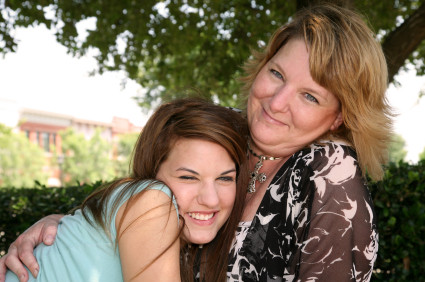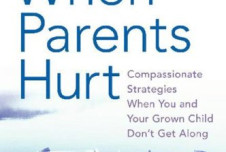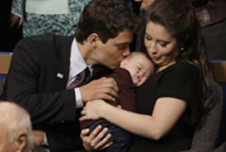
Psychologist and author Joshua Coleman is an internationally recognized expert on parenting and marriage, among other topics. In his last post, Dr. Coleman explored the roots of conflicts between parents and their adult children.
Today he continues his series on parent-child conflict by explaining how parents can start to repair a damaged relationship with their child.
My clinical experience has shown me that while parents are not always directly to blame for an estrangement or ongoing conflict with their children, typically they are the ones who have to initiate repairing the relationship.
I realize that this can often seem like a tall order; indeed, getting parents to take the lead is not always an easy task. This is because most parents feel like they have invested a lot in their children and shouldn’t have to go hat-in-hand to try to get their child back into their lives. Plus, it’s hard for many parents to hear how they may have let their children down, let alone admit to those shortcomings. In addition, some adult children keep the door so tightly closed that the parent must face ongoing rejection and even abuse if they try to reach out. Under those conditions, many parents will feel tempted to give up.
But for those parents out there who haven’t given up, you should know that it’s hard to get very far in a parent-child reconciliation without honestly acknowledging the ways you may have contributed (or continue to contribute) to the difficulties between you and your child. It isn’t a cure-all—you may be facing problems bigger than the both of you: your child may have a mental illness, or is married to a troubled or possessive spouse; you may have to deal with an ex who wants to perpetuate the conflict between you and your child; or your child may need to blame you so that they don’t blame themselves for the way that their life turned out. What’s more, your own childhood history may have worn thin the skin you need to withstand your child’s complaints long enough to cobble together a healthy response to them.
But you have to start by trying to understand why your child feels the way they do about you—not because you deserve a proportionate punishment for your mistakes (real or perceived) but as an act of parenting, one that recognizes the changing nature of parent-child relations today.
 © Steve Debenport
© Steve Debenport
To explain what I mean by this, consider my last post, where I talked about the ways that parenting has changed in the past century and how those changes have affected parent-adult child relations today. One of these changes is that parents now want and expect a closer relationship with their adult children.
Yet a recent study found that overall, parents in the U.S. report more conflict with their adult children than parents in other countries. The study compared the U.S. with Israel, Spain, Germany, and the U.K. and found that the relationship between adult children and their aging parents were the most “disharmonious” in the U.S.
A key reason for this is the highly individualistic nature of family relations in the U.S. While there are many cultural, economic, and institutional forces that organize family life, the primary determinant for whether family members remain close in the U.S. is based on how the relationship makes the individuals within those relationships feel.
Something similar has been happening with marriage. More than any other country, couples in the U.S. decide to get married or divorced based on whether or not their spouse is a good romantic partner. Staying in an unromantic or unfulfilling marriage is not only considered a waste of time, with or without children, but an act of existential cowardice. As sociologist and Council on Contemporary Families member Andrew Cherlin observes in his book, The Marriage Go-Round: The State of Marriage and the Family in America Today, Americans marry, divorce, remarry, and re-partner far more than individuals in any other industrialized country.
In the same way that couples decide to stay or leave romantic relationships based on whether the relationship is fulfilling, many adult children are now deciding whether to stay connected to their parents based largely on their evaluation of how rewarding their relationship was with them in the past or remains in the present. And since these are the criteria by which parents are judged today, parents are wise to pay attention to them if they seek a better relationship with their adult children.
This requires that parents recognize the “separate realities” nature of family life. That is, a parent can reasonably believe that they did a good job as a parent—and their child may reasonably wish they had done something quite different. In romantic relationships, there’s typically at least a kernel of truth in our partner’s complaints about us. The same goes for our children’s.








Comments
I often joke that in the US everyone is quick to “never to speak
to you again” because there is a surfeit of housing. In most
countries I’ve lived in overseas, there is a housing shortage or
housing is difficult to come by. This means that you have to live
with otherwise unsavory relatives and you learn to forgive and
tolerate. In the former Soviet Union, it was common for
divorced couples to remain living together because there wasn’t
any housing available. Europe also has expensive or difficult
housing. It’s better to get along and stay home than to be
thrown out on the street, unless there is alternate housing
available.
Colin Credle | 4:41 pm, November 2, 2010 | Link
From my limited personal experience, I know of far more
parents that have unilaterally decided to cut their adult children
out of their lives for some of the flimsiest reasons. What is sad is
that no effort at reconciliation seems to matter. My wife is from
another country where traditional families are tight. When she
lamented to a Russian immigrant that my mother wouldn’t talk
to us anymore, the Russian waved her hand dismissively saying
“Oh, they’re all like that here.” I could not argue. Too many of
my peers (I’m 42) have the same experience; angry parents
refusing to talk to their adult children, or have anything to do
with their grandchildren.
Colin Credle | 4:42 pm, November 2, 2010 | Link
Four ACTIONS that can never be recovered: The
stone after it’s thrown, the word after it’s spoken,
the occasion after it’s missed, and the time after
it’s gone.
Kevin Asselin | 1:55 pm, November 22, 2011 | Link
Estrangement seems to be more common, and has some common misconceptions. I’m estranged from my mother, and am frustrated with the red herrings that commentators throw about. Like, nobody’s perfect. That parents are being blamed for their children’s problems. Or that the child is merely stuck and damaged from the past. As if children are a bunch of whiny irresponsible ninnies. Many of us are not. Many times parents continue to be destructive and have very little insight into how crazy they are.
I think - and this comes from my own experience - that de-estrangement (!) has a lot to do with a parent’s willingness to do a do-over. How wondrous it is when a parent can say something like, I know I screwed up, let’s try something new that’s win-win for both of us, and you let me know if it works for you. That kind of maturity is missing quite frankly from a number of parents. I think there’s a higher prevalence of personality disorders than is acknowledged. I think parents, especially those who’ve workshopped/therapied themselves to death can often ironically become more defensive and more masked. Their words become better weapons to hide behind.
It takes grace, wisdom and vision to reconcile. I only wish my mother was mature enough to be empathic, solid and not defensive.
Tessa B | 5:49 pm, November 23, 2011 | Link
The author doesn’t say whether he has ever raised a
child to age 17. Unless he has, he is not qualified.
Neil Elliott | 7:02 pm, June 30, 2012 | Link
Utter psychobabble. Travel and enjoy your friends. When they suspect the inheritance is being spent, they will get curious and come back around.
Clarice | 3:17 pm, October 8, 2012 | Link
I wholeheartedly agree with Tessa B. In my experience
having one loving parent and one selfish parent, there is a
vast difference between the two. My loving parent (who is
by no means perfect yet is perfectly lovable) has always
been able to meet the responsibility of (single) parenting
three children with compassion, love, leadership, and
humor. My loving parent has made mistakes but has always
made us feel loved and valued. If there ever were
disagreements or issues, she met them with maturity,
wisdom,& creative problem-solving. In short, she was and is
completely trustworthy, & worthy of our love, respect,
dedication, and trust. The selfish parent always made
everything about him and we always came second (or not
at all) to his work, whomever he was dating, and what his
needs were with regard to presenting an “obedient, happy
family”. Though given a million chances, he never put in
the actual work of parenting but expected all the rewards.
He was, and remains to this day, the complete opposite of
a good parent or even an o.k. parent. No amount of money
(and supposedly he has lots of it) would make up for the
fact that he’s immature, cruel, and meanspirited. Even
though he was emotionally abusive, I do not for one
moment feel entitled to his wealth. Never did. The money
was never what I wanted. All I wanted was for him to be
kind to me, my siblings, and to my mom, even when I was a
little girl. Well into my adult life, I realized that he will
never be the good guy I’d hoped he would be, but I still
held out hope that he would try. I gave him too many
chances and even gave him the answers of how he could
make things right (a simple “I’m sorry” and “let’s try to find
common ground” went unnoticed). I don’t wish him ill, I just
want him to leave me alone so that I can continue to enjoy
my life, giving and receiving love with the wonderful, kind
souls I am fortunate to have around me. And thanks to my
mom for showing me how to be kind to myself and give
back big love to those who want it where there was once a
giant, endless hole from his absence. I am able to live a full
and happy life now. Sometimes estrangement is for the
better.
Tru | 11:13 pm, November 30, 2012 | Link
Like the butterfly pursued, but ever elusive….to land on you when you stop and rest. Leave your adult children alone. They will return, or they won’t. If you sincerely said “I’m sorry,” then you simply must just get on with your life and allow them to sort it out for themselves. You may get what you want (reconnection) or you may only get what you deserve. Especially if you discarded their father/mother, they may consider you just as easily discarded. If you’ve judged their life choices, they will judge you. Life’s not fair, but then again, in some ways it is….tit for tat.
A Blachly | 10:38 am, January 8, 2013 | Link